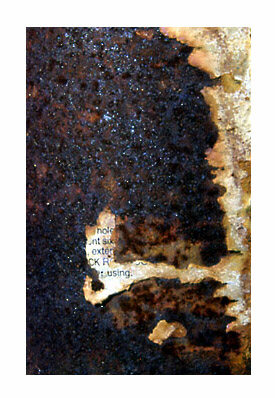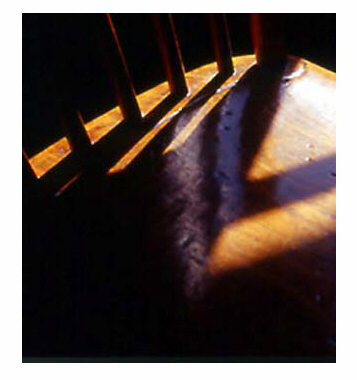Curiously, I happen to have progressed through these stages chronologically in my own life, before knowing that any of them existed. In college and before, I was a part-time, sometimes-wannabe nature mystic, an amateur Wordsworth entranced by the light of the setting sun, and the motion and spirit that runs through all things. It is easy to laugh at my Romantic self, but I cherish it; solitary times, alone in nature, were my first taste of God.
 Following college, I began studying mysticism, and recognized within the Jewish tradition some of what I had found attractive in my brief Zen practice, and my study of 'Eastern' religions. I was attracted primarily to the mystical aspects of both Judaism and Buddhism, and chose the Jewish path because I knew it better: I knew the language, the customs, and the community; I was part of the culture. It fit. In davening and Torah study, being in holy places and among holy people, I occasionally was fortunate to have 'peak experiences' of the Divine, on what Wilber calls the 'subtle' level, and came to see my Jewish practice as both a path to such experiences and, as Heschel wrote, a response to them. (I have written an entire book on the complexities of that last sentence, and so it is difficult to just let them sit there. I'll restrict myself to an aside that the Hasidic model sees the mitzvot as a way toward devekut, cleaving to the Divine, whereas the Mitnagdic model sees them as a response to the existence of the Divine. I think we can integrate both.)
Following college, I began studying mysticism, and recognized within the Jewish tradition some of what I had found attractive in my brief Zen practice, and my study of 'Eastern' religions. I was attracted primarily to the mystical aspects of both Judaism and Buddhism, and chose the Jewish path because I knew it better: I knew the language, the customs, and the community; I was part of the culture. It fit. In davening and Torah study, being in holy places and among holy people, I occasionally was fortunate to have 'peak experiences' of the Divine, on what Wilber calls the 'subtle' level, and came to see my Jewish practice as both a path to such experiences and, as Heschel wrote, a response to them. (I have written an entire book on the complexities of that last sentence, and so it is difficult to just let them sit there. I'll restrict myself to an aside that the Hasidic model sees the mitzvot as a way toward devekut, cleaving to the Divine, whereas the Mitnagdic model sees them as a response to the existence of the Divine. I think we can integrate both.)
Only in the last two years have I cultivated the sorts of practices that lead to causal and nondual awareness. I had glimpses of the numinous before, but they were flickers of light, and not more than that. I studied, read, and wrote about unio mystica, and puzzled through its implications. How could we be sure that our experience is an experience of union? What if this is all the mere buzzing of neurons in our own individual minds? How do the mystics themselves evaluate their 'experiences'? But I didn't really know what I was talking about, because I had only been there in elusive and allusive ways. I am still very much a student of these practices today - not a teacher. I write about them in Zeek partly because I think a student's perspective - still uncertain, still with one foot in the normal, finite world that questions all of this - is valuable. My beginner's mind is valuable for what it is. Where I often find myself, though, is in a flux of belief and doubt.
Today is the first clear sky after two solid days of snow. It is cold, and clear, and I am staying inside. I had been planning to write Ken Wilber a letter - this article will be modified and sent to him as such - because an old, old doubt kept nagging me. I get the whole map, I understand it, and I have been there. But I still wonder, despite myself, if it isn't all just a good buzz. "Flatland" - the view that there is nothing in the world that cannot be explained through fully materialistic science - is so compelling! I read about Wilber's years of working with the mantra mu, and it sounds to me like going downwards, not upwards. It sounds like the mind is being, if not repressed, then effaced, eroded. Sure, repeat 'mu' to yourself a thousand times and you'll think you're one with everything. It doesn't mean it's true. Just because it seems like God doesn't mean it is God.
And emet (truth) remains too much of a value for me to let go. I am learning that there are reasons to let go of the nagging cognitive apparatus that doubts and checks and re-checks whether something is true. But the only reason I embrace is to do so in the service of more truth.
This morning, while I was thinking about this, three things happened.
First, I noticed how when I am in doubt, the position of belief seems wildly implausible.
Come on - of course mysticism is just buzzing neurons. Wilber is a flake.
 Next, I calmed down a little, and, remaining calm, tried to remember what I actually think. I remembered that, within the scientific worldview as I understand it, there really is no place for the chief delusion of Western thought: the reality of the individual 'I.' What is this ego, with "free will" that somehow exists separate from everything else? Look around you right now - what is not part of the One? All the matter and energy around you can be changed into something else; at this moment, it is, of course, real in its present form. But it is not ultimately separate from anything. And that includes the stuff in your brain.
Next, I calmed down a little, and, remaining calm, tried to remember what I actually think. I remembered that, within the scientific worldview as I understand it, there really is no place for the chief delusion of Western thought: the reality of the individual 'I.' What is this ego, with "free will" that somehow exists separate from everything else? Look around you right now - what is not part of the One? All the matter and energy around you can be changed into something else; at this moment, it is, of course, real in its present form. But it is not ultimately separate from anything. And that includes the stuff in your brain.
The irony is that, for me, science and intellection are one of the most useful paths away from doubt and toward remembering.



Harvard Death Fugue
On the Exploitation of Bruno Schulz
James Russell
The Jews of Istanbul
Sara Liss
The Truth about the Rosenbergs
Joel Stanley
Thinking despite Doubt, Feeling despite Truth
Jay Michaelson
Two Rituals
Joshua Bolton
Hepster Advice
Jennifer Blowdryer
Josh Goes to the Hospital
Josh Ring
Archive
Our 400 Back Pages
Saddies
David Stromberg
Zeek in Print
Winter 03 issue now on sale
About Zeek
Events
Contact Us
Links
From previous issues:
Carrying Light into Dark Times
Rabbi Zalman Schachter-Shalomi
Meditation and Sensuality
Jay Michaelson
Primal Scream Judaism
Temima Fruchter